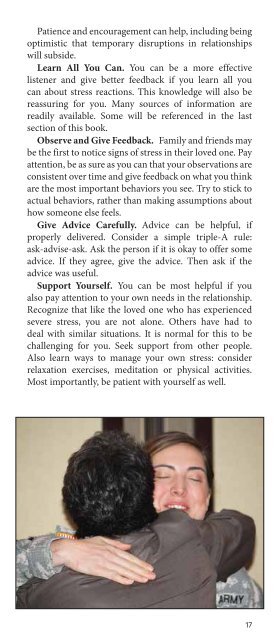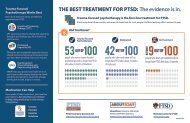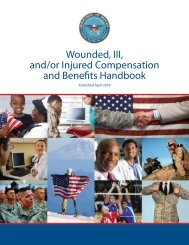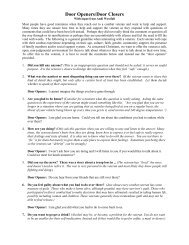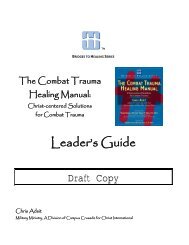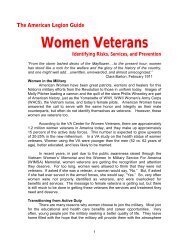DAV PTSD Brochure
Create successful ePaper yourself
Turn your PDF publications into a flip-book with our unique Google optimized e-Paper software.
Patience and encouragement can help, including being<br />
optimistic that temporary disruptions in relationships<br />
will subside.<br />
Learn All You Can. You can be a more effective<br />
listener and give better feedback if you learn all you<br />
can about stress reactions. This knowledge will also be<br />
reassuring for you. Many sources of information are<br />
readily available. Some will be referenced in the last<br />
section of this book.<br />
Observe and Give Feedback. Family and friends may<br />
be the first to notice signs of stress in their loved one. Pay<br />
attention, be as sure as you can that your observations are<br />
consistent over time and give feedback on what you think<br />
are the most important behaviors you see. Try to stick to<br />
actual behaviors, rather than making assumptions about<br />
how someone else feels.<br />
Give Advice Carefully. Advice can be helpful, if<br />
properly delivered. Consider a simple triple-A rule:<br />
ask-advise-ask. Ask the person if it is okay to offer some<br />
advice. If they agree, give the advice. Then ask if the<br />
advice was useful.<br />
Support Yourself. You can be most helpful if you<br />
also pay attention to your own needs in the relationship.<br />
Recognize that like the loved one who has experienced<br />
severe stress, you are not alone. Others have had to<br />
deal with similar situations. It is normal for this to be<br />
challenging for you. Seek support from other people.<br />
Also learn ways to manage your own stress: consider<br />
relaxation exercises, meditation or physical activities.<br />
Most importantly, be patient with yourself as well.<br />
17


